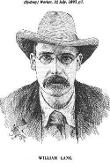William Lane, of Irish-English parentage, was the eldest of five sons and one daughter. After his education at Bristol Grammar School, Lane worked his passage to Canada in 1867. He had various jobs before becoming a compositor, then reporter in Detroit during the 1880s. The American experience developed his radical thinking and he was influenced by the socialists Henry George and Edward Bellamy. Lane married Anne Mary McQuire in 1883. The couple sailed with their daughter for England in 1885. They stayed there briefly before travelling to Brisbane, Queensland, to join Lane's brothers who had preceded him to Australia. He worked as a journalist for Figaro, the Telegraph, the Courier and the Observer. He wrote under various pseudonyms including 'Sketcher' and 'Bystander'. The one mostly used, 'John Miller', came from the first chapter of the Marxist romance, A Dream of John Ball by William Morris (1887).
Lane and a compositor friend Alfred Walker established The Boomerang in 1887 and it was from his reporting on labour issues that he became an active participant in Queensland's trade union movement. Lane was at the forefront of the Queensland Australian Labour Federation (ALF), which established a new paper, The Worker (1890), that Lane edited, supporting the strikes of 1890 and 1891. His first novel, White or Yellow? A Story of the Race War of A.D. 1908, was serialised in the Boomerang in twelve episodes in 1888 under the pseudonym of 'Sketcher', but Lane's best-known work is The Workingman's Paradise, written to raise funds for the families of unionists jailed for conspiracy during those strikes and to explain socialism to the world.
Lane was familiar with utopian communities in North America and founded the New Australia Co-operative Settlement Association in the early 1890s. In 1893 more than 200 colonists travelled with Lane to Paraguay where he established a settlement. Notably, Lane's niece, the opera singer and poet Hilda Lane (q.v.), was born at the settlement which was founded by her uncle. Disappointed by the refusal of members to adhere to his strict social rules, Lane migrated to New Zealand in 1899. Here he wrote for Auckland's conservative New Zealand Herald. With the pseudonym of 'Tohunga' (the Maori word for prophet) Lane reversed his radical thought and denounced many of the causes he had championed while in Australia.
Lane's philosophies have been analysed in the introduction by Michael Wilding (q.v.) to the 1980 facsimile edition of The Workingman's Paradise. Lane has been featured in various other works, including Hail Tomorrow (1947), a play by Vance Palmer (q.v.) about the shearers' strike of 1891.

 3067787231224951058.jpg
3067787231224951058.jpg